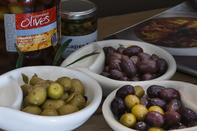Olives are versatile little fruit, are used to make a variety of value-added products, apart from producing olive oil - the main olive-relate product in South Africa. Other olive-related products include table olives, processed olive foods, such as olive tapenade and olive skincare products.

Olive oil is made to various standards, the best quality being extra virgin olive, which also contains the most health benefits.
Oils can also be flavoured or blended with flavour ingredients to create unique products such as truffle oil, fennel-infused olive oil or chilli and garlic oils.
Table Olives
Fresh olives are bitter and need to be cured to leach the acrid glucosides from the fruit before it becomes edible. There are various ways of curing olives: brine curing involves a lacto-fermentation procedure - soaking the olives in a saltwater brine over a period of time. Olives can also be cured by packing them in salt, soaking in water and rinsing frequently over many months as well as lye curing - a Spanish method used for green olives
The most popular cultivars for the production of table olives in South Africa is Manzanilla, Mission and Kalamata.
The plump and meaty Manzanilla (‘little apple’ in Spanish) is the premium variety for green processing and has a large pip-to-flesh ratio. Good for use as a pitted olive or stuffing olive, but has a low oil content.
Mission is a smaller olive than Manzanilla. The most planted olive variety in South Africa - 659 ha compared to 133 ha planted to Manzanilla. Good for black table olive production, but can also be used for olive oil.
Kalamata olives are increasing in South Africa with 161 hectares planted. It is used for black table olives and has a lower oil content than Mission.
Table Olive Products
Olives can be brined, pickled or packed into oil and can be ‘plain’ or flavoured. Biltong-flavoured olives, olives flavoured with herbs, combined with sundried tomatoes and feta cheese or pesto are all examples of value-added table olive products.
Table olives can be packed in brine, oil or nitro-flushed into plastic pouches, cans or in glass jars. Larger volumes of olive such as 5 kg and 15 kg are packed in plastic buckets. Canned olives tend to lose their nutritional value in the process.
Olives can be freeze-dried, dried with warm air, salt-dried or sundried.
Processed Olive Products
Olives can be combined with other ingredients, such as onions and chillies to prepare relishes, chutneys and jams or can be pickled and enhanced with wild garlic or herbs.
Olive tapenade is a paste made from pitted and crushed black olives, mixed with capers and olive oil. It can be flavoured with anchovies, lemon and thyme and used as a spread on bread or incorporated into fish, pasta or vegetable dishes.
Olive paté is made with crushed olives, which can be flavoured or plain.
Natural Skincare Benefits of Olive Oil
Olive oil has been used as an antibacterial agent, cleanser, moisturiser and massage oil for skin, nails and hair for thousands of years. Modern applications of olive oil also incorporated it into soaps, body scrubs, balms and butters, olive baby care products and insect repellent balms.
Olive oil contains a host of beneficial agents including vitamin E, squalene, polyphenols as well as a variety of ‘good’ fatty acids - mainly oleic acid 75% - but also, linoleic acid, linolenic acid and palmitic acid.
Polyphenols may be responsible for some of the medicinal properties of olive oil these include anti-inflammatory, antiviral and immunomodulatory actions.
It is believed that olive oil is possibly the only plant-based source of squalene and squalane. These compounds, also found in shark’s liver, are natural emollients that can reduce wrinkles, scars and pigmentation.
Oleic acids (omega 9) are known to eliminate dandruff and stimulate hair growth. Linoleic acids (omega 6) facilitate wound healing, soothe acne and promote moisture retention in skin and hair. Linolenic acid (omega 3) reduces inflammation and vitamin E is a powerful antioxidant and is abundant in fresh olive oil.
Please note: Information is for educational and informational purposes only and may not be construed as medical advice. The information is not intended to replace medical advice or treatment offered by healthcare professionals.
By Marinda Louw
For bulk or Olive Products export enquiries please use the enquiry link below.